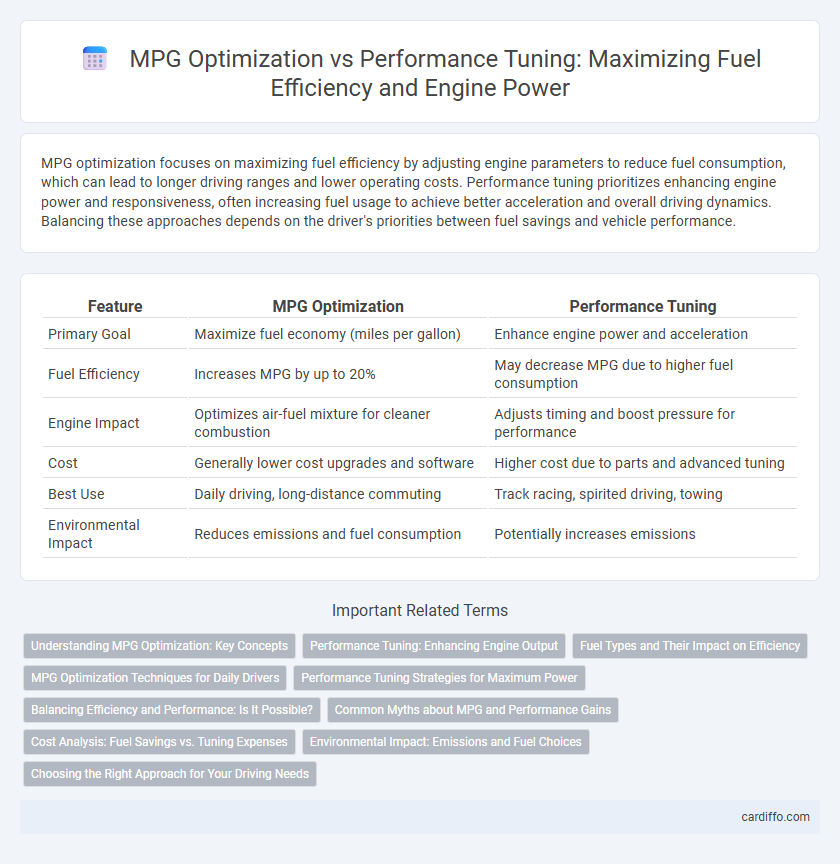MPG optimization focuses on maximizing fuel efficiency by adjusting engine parameters to reduce fuel consumption, which can lead to longer driving ranges and lower operating costs. Performance tuning prioritizes enhancing engine power and responsiveness, often increasing fuel usage to achieve better acceleration and overall driving dynamics. Balancing these approaches depends on the driver's priorities between fuel savings and vehicle performance.
Table of Comparison
| Feature | MPG Optimization | Performance Tuning |
|---|---|---|
| Primary Goal | Maximize fuel economy (miles per gallon) | Enhance engine power and acceleration |
| Fuel Efficiency | Increases MPG by up to 20% | May decrease MPG due to higher fuel consumption |
| Engine Impact | Optimizes air-fuel mixture for cleaner combustion | Adjusts timing and boost pressure for performance |
| Cost | Generally lower cost upgrades and software | Higher cost due to parts and advanced tuning |
| Best Use | Daily driving, long-distance commuting | Track racing, spirited driving, towing |
| Environmental Impact | Reduces emissions and fuel consumption | Potentially increases emissions |
Understanding MPG Optimization: Key Concepts
MPG optimization focuses on maximizing fuel efficiency by adjusting driving habits and vehicle settings such as tire pressure, air filter cleanliness, and engine timing. Understanding key concepts like the air-fuel ratio, proper maintenance schedules, and lightweight components helps achieve higher miles per gallon without compromising vehicle longevity. These strategies reduce fuel consumption while maintaining essential engine performance parameters.
Performance Tuning: Enhancing Engine Output
Performance tuning enhances engine output by optimizing fuel injection timing, ignition advance, and airflow dynamics to maximize horsepower and torque. Advanced techniques include ECU remapping and upgrading turbochargers or exhaust systems, which improve throttle response and engine efficiency. These modifications result in a more powerful driving experience but may impact fuel consumption compared to standard MPG optimization strategies.
Fuel Types and Their Impact on Efficiency
Fuel type significantly influences both MPG optimization and performance tuning, with regular unleaded gasoline offering balance for fuel efficiency, while premium fuels provide higher octane levels that enhance engine performance. Diesel fuel, known for its higher energy density, delivers superior fuel economy but may require specific tuning to maximize performance without increasing emissions. Ethanol blends like E85 can boost performance through higher octane ratings but typically lower MPG due to reduced energy content per gallon.
MPG Optimization Techniques for Daily Drivers
MPG optimization techniques for daily drivers include regular maintenance such as timely oil changes, proper tire inflation, and air filter replacement to enhance fuel efficiency. Utilizing smooth acceleration, avoiding excessive idling, and reducing unnecessary weight contribute significantly to better miles per gallon. Incorporating high-quality fuels and advanced fuel additives can further improve combustion efficiency and engine performance without compromising daily driving practicality.
Performance Tuning Strategies for Maximum Power
Performance tuning strategies for maximum power prioritize enhancing engine output through precise adjustments to fuel injection, ignition timing, and turbocharging systems. Optimizing air-fuel ratios and utilizing advanced ECU remapping techniques significantly increase horsepower and torque while maintaining efficient combustion. High-flow exhaust upgrades and improved cooling systems support sustained engine performance under aggressive tuning conditions.
Balancing Efficiency and Performance: Is It Possible?
MPG optimization and performance tuning often present a trade-off between fuel efficiency and engine power. Advanced fuel injection systems and precise engine mapping can achieve a balance, enhancing fuel economy without significantly compromising horsepower. Modern vehicles use adaptive technologies like variable valve timing and turbocharging to maintain optimal fuel consumption while delivering responsive acceleration.
Common Myths about MPG and Performance Gains
Fuel efficiency myths often suggest that aggressive performance tuning always reduces miles per gallon, but careful calibration can enhance both MPG and engine output. Many drivers believe increasing horsepower drastically lowers fuel economy; however, modern tuning techniques optimize air-fuel ratios and ignition timing to balance power gains with fuel savings. Understanding the intricacies of ECU remapping reveals that MPG optimization and performance improvements are not mutually exclusive but can be strategically combined.
Cost Analysis: Fuel Savings vs. Tuning Expenses
MPG optimization can significantly reduce fuel expenses by improving vehicle efficiency, often yielding savings that exceed the initial investment in tuning. Performance tuning typically involves higher upfront costs for hardware and labor, which may not be fully offset by fuel savings alone. Evaluating the balance between decreased fuel consumption and tuning expenses is crucial for cost-effective decisions in vehicle modifications.
Environmental Impact: Emissions and Fuel Choices
MPG optimization reduces fuel consumption and lowers greenhouse gas emissions by promoting efficient driving habits and engine calibration, directly benefiting air quality. Performance tuning often increases fuel usage and emissions due to enhanced power output and aggressive fuel mapping, raising environmental concerns. Choosing fuel-efficient methods supports sustainability goals by minimizing carbon footprint compared to performance-focused modifications.
Choosing the Right Approach for Your Driving Needs
MPG optimization focuses on enhancing fuel efficiency by fine-tuning engine settings and reducing fuel consumption, ideal for drivers prioritizing cost savings and environmental impact. Performance tuning, on the other hand, increases horsepower and acceleration by modifying air intake, exhaust systems, and engine mapping, suitable for those seeking enhanced driving dynamics. Selecting the right approach depends on whether maximizing miles per gallon or achieving superior vehicle performance aligns better with your driving habits and goals.
MPG Optimization vs Performance Tuning Infographic

 cardiffo.com
cardiffo.com